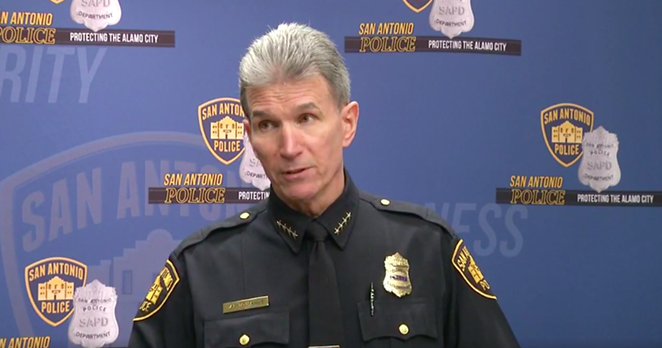Update — Dec. 5, 3:30 p.m.:
This post has been since been updated to reflect comments from San Antonio City Councilman Greg Brockhouse.
On December 23, San Antonio police detained Herbert Alan Nichols for smuggling a dozen immigrants in the back of his semi truck. He was stopped near Splashtown, where police sat the passengers down on the sidewalk to assess the situation.
After hauling the 12 back to San Antonio Police Department headquarters, police called representatives with Catholic Charities (a legal aid organization for immigrants) to come pick them up. None of the immigrants were asked about their immigration status or were charged with a crime. In the officer's eyes, the passengers were simply witnesses, or victims, of the alleged smuggling.
"We did not have any authority to detain them," said SAPD Chief William McManus at a Thursday press conference.
Police did arrest Nichols, slapping him with a human smuggling charge at the state level, which puts the case in the hands of the Bexar County District Attorney Nico LaHood. It's an unusual call for an immigration-related case — LaHood says this is the first smuggling charge SAPD has brought him since he took office in 2015.
With these types of crimes, McManus has the authority to either hand a case over to the state or to the federal government. The vast majority of the time, immigration-related cases are sent to the feds. But on Dec. 23, McManus decided it was a state-level crime.
"This call was situational, based on a fairly fluid situation on the scene," he said. "It's not necessarily how every case will be handled going forward."
But McManus' "situational" decision is a game-changer.
On the surface, this case seems nearly identical to the July incident where another semi-truck driver was found hauling dozens of immigrants in his trailer. But in that case, SAPD contacted U.S. Immigration and Customs Enforcement after discovering the group of overheated undocumented immigrants (some of which had already passed away). Thus, most of the 22 survivors were placed in federal custody, where they were held until a federal judge dismissed them a month later. At least two of them have since been deported by ICE.
In this case, however, the smuggled immigrants were released to Catholic Charities, unquestioned about their immigration status. Free to go.
According to Texas' smuggling law, law enforcement officials aren't required to prove if a smuggled victim is undocumented if it's clear the suspect wanted to "transport an individual with the intent to ... conceal the individual from a peace officer or special investigator." That's not the case in federal law, which explains why the July victims have been detained — or deported— since entering federal custody.
Not all city leaders are backing McManus’ call. While it’s uncommon for victims of a crime to be criminally investigated, Councilman Greg Brockhouse said he believed McManus had “more than enough probable cause” to assume the smuggled immigrants were undocumented — enough to prompt officers to run a criminal background check on the dozen.
“All I’m asking is that we make sure we’re not releasing a felon into the public,” Brockhouse said. “The policy can’t be on the fly ... based on what the chief feels like doing that day.”
He publicly questioned McManus’s decision in a December 5 press release, calling for an investigation into how the incident was handled.
McManus’ contested decision comes amid an ongoing state and national debate over so-called "sanctuary cities."
The discussion centers on whether or not local law enforcement agencies are required to comply with requests from ICE officials to detain immigrants suspected of being in the country illegally — even if they haven't officially been charged with a crime, or their charges have been dropped.
That's why the federal government has called San Antonio, along with dozens of cities nationwide, a sanctuary city — because it doesn't require its officers to comply with "detainer requests" from the federal government, or allow officers to inquire about a person's immigration status.
Texas' Senate Bill 4, a new law mandating state law enforcement agencies do the exact opposite, is currently being challenged by multiple Texas jurisdictions (including San Antonio) in the state court system.
Meanwhile, at the national level, President Donald Trump's request to cut funding to sanctuary cities has been blocked in court, but it hasn't stopped Trump's appointees from speaking out on the issue. McManus' press conference comes two days after acting ICE Director Thomas Homan announced he wanted to arrest political leaders of self-proclaimed sanctuary cities.
Despite brushing up against a clearly contentious topic, McManus appeared unfazed at the Thursday meeting.
Asked by a reporter if he made the right decision in turning the case to over to the state, he didn't hesitate.
"Yes. That was absolutely in my mind the right decision at the time," he replied.


